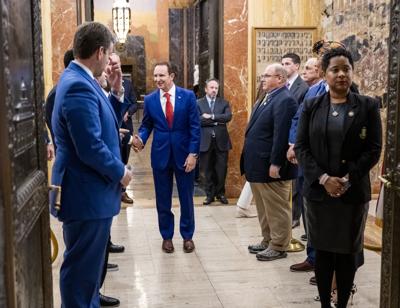Governors in Louisiana are notoriously powerful, with extensive formal authority and even broader informal influence.
New governors coming off big victories are stronger still, what with the traditional honeymoon effect.
And new governors who have a Legislature and other statewide offices firmly controlled by their own party? Well, the sky could be the limit.
Or not.
Immediately upon taking office, Gov. Jeff Landry knew he had to call a special legislative session to deal with a court-ordered congressional redistricting, or else allow a federal judge to draw new maps that no politician who understands the spoils at stake would want.
But instead of keeping things narrow, Landry went huge and also proposed, among other things, a complete upend to the way the people who’d just put him in office vote.
Not just a debate over replacing Louisiana’s long-standing jungle primaries with closed party primaries, but lightning-speed action, so fast that lawmakers would adopt a new voting system — and draw congressional districts in a tense, racially charged atmosphere, and also make big changes to how state Supreme Court justices are elected — all in just eight days.
On primaries, Landry essentially asked that lawmakers bend to his will without a clear mandate (because he didn’t make the case in his campaign); without support from most voters, according one poll; without, it became obvious, the comfort of many legislators; and without a convincing public rationale — particularly when, as initially written, the new law would significantly curtail the ballot access of some 800,000 voters who aren’t registered as Republicans or Democrats.
Calling the ask audacious is to undersell it. It was really a test of whether the very friendly legislative majority would dare defy him.
Now we know the answer, and it’s yes.
Thursday, after hints of deep discomfort over several days, a Senate committee watered down the party primaries proposal by state Rep. Julie Emerson, R-Carencro, so that it would only apply to congressional and state Supreme Court seats and would start in 2026, not in time for this fall’s congressional elections under whatever new maps are finally approved. Friday, the full Senate added Public Service Commission and Board of Elementary and Secondary Education elections but — and this is not at all what proponents wanted — allowed voters who are not registered in a party to vote in party primaries after all. The House agreed and sent it Landry's desk.
The new scheme still gives the governor something to call a win — making the highest level judicial elections partisan sure plays to his party’s agenda — but it stops way short of what he asked for.
It’s not that many legislators were looking to pick a fight. It’s that there just weren't good arguments for acting with urgency, other than the implicit one: because they can.
A powerful case for taking more time came from a Landry ally, new Secretary of State Nancy Landry (no relation), who warned not only of the high cost of switching by this fall but also said it risked “disaster.”
“Rushing leads to errors and mistakes, and we cannot afford to have mistakes in an election,” she said.
More came from a poll done for opponents, which found overwhelming public opposition to changing a system that voters know and like — as well as a warning that they could well turn on politicians who mess with their vote.
Nor could the governor's close allies in the state Republican Party make an honest case that the current system works to their disadvantage. Up and down last fall’s ballot, conservative Republicans beat not only Democrats but old-school, less partisan Republicans.
Emerson said at one point that “if you’re choosing a candidate to represent a particular party, the voters in that party ought to be the ones who do it.” But that argument basically boils down to prioritizing some voters’ voices over others.
For the record, Landry isn’t the first governor to get brushed back by the Legislature in his first days. John Bel Edwards did too, when he tried to install a Democratic speaker to lead a majority Republican House — in effect, turning what was meant as a show of strength into evidence of weakness.
But Edwards and GOP lawmakers were always destined to clash over how to share power, whereas Landry is overseeing what amounts to one-party government.
The former governor did learn from his first big misstep, and found success when he took lawmakers’ own politics into account.
Landry — who in the session's last moments also lost his bid to remake the state Supreme Court — is still likely to get most of what he wants from a Legislature that boasts Republican supermajorities on both sides. But his brief first session suggests he'd still be wise to make like Edwards and learn to approach his coequal branch of government with some humility.
We'll see if he has it in him.

